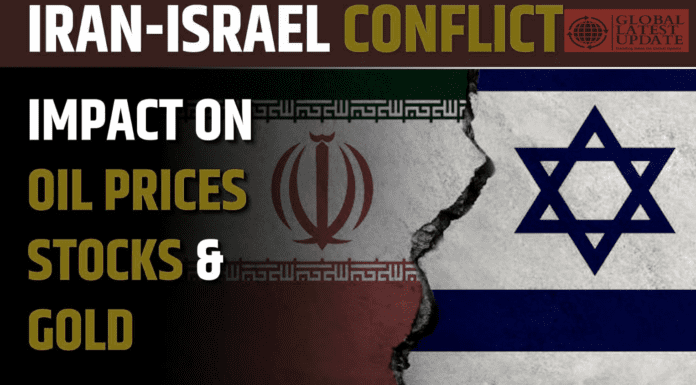The Geopolitical Dynamics of the Israel-Iran Conflict Implications for Global Markets.
1 min read 2024-04-15, 09: 10 PM IST
In Short ⇒ The Israel-Iran conflict stems from historical, ideological, and geopolitical factors, escalating tensions since the Iranian Revolution of 1979. ⇒ Recent drone attacks and cruise missile strikes allegedly carried out by Iran against Israeli targets have heightened concerns about a full-scale war. ⇒ Geopolitically, the conflict has implications for destabilizing the Middle East and involving other global powers like the United States and Russia. ⇒ Global markets are impacted by uncertainty, particularly in energy sectors due to potential disruptions in oil supplies and increased market volatility. ⇒ Aviation sectors face challenges with airspace closures and rerouted flights, while defense industries may see increased demand. |
In recent times, the world has been witness to escalating tensions between Israel and Iran, with the specter of war looming large. The geopolitical dynamics of this conflict not only have profound implications for the Middle East but also reverberate across global markets and economies. In this comprehensive analysis, we delve into the intricacies of the Israel-Iran conflict, its potential ramifications on various sectors, and the broader implications for global stability.(also read: Indians Advised to Exercise Caution Amidst Iran’s Plans for Strike on Israel).
Historical Context
The animosity between Israel and Iran is deeply rooted in historical, ideological, and geopolitical factors. Since the Iranian Revolution of 1979, Iran’s leadership has openly espoused anti-Israel rhetoric, supporting militant groups like Hezbollah and Hamas. Meanwhile, Israel perceives Iran as an existential threat due to its nuclear ambitions and support for anti-Israel proxies.(read also: Palestinians Struggle to Celebrate Ramadan Amid Ongoing Israeli Attacks).
Recent Escalations
Recent escalations in the conflict have heightened concerns worldwide. Reports of drone attacks and cruise missile strikes allegedly carried out by Iran against Israeli targets have exacerbated tensions. The possibility of a full-scale war between the two regional powers is no longer a remote scenario but a tangible reality.(also read: Iran Issues Warning Threatens Strike on US Bases Amid Support for Israel’s Response).
New Global Update- your speediest source for breaking news! READ NOW →
Geopolitical Implications
The Israel-Iran conflict has far-reaching geopolitical implications. It has the potential to destabilize the entire Middle East region, exacerbate existing conflicts, and trigger a wider regional conflagration. Furthermore, the involvement of other global powers, such as the United States and Russia, adds another layer of complexity to the situation.
Impact on Global Markets
The uncertainty surrounding the Israel-Iran conflict has sent shockwaves through global markets. Investors are wary of potential disruptions to oil supplies, given the strategic location of the Middle East. Moreover, heightened geopolitical tensions often lead to increased market volatility, affecting stock prices, currencies, and commodities.(also read: World Share Market Today).
Sectoral Analysis
The impact of the Israel-Iran conflict is not limited to financial markets but extends across various sectors. Aviation, for instance, faces challenges due to airspace closures and rerouted flights. Energy markets are particularly sensitive to disruptions in oil production and transportation routes. Additionally, defense industries may witness increased demand for military hardware and technology.(also read: Asia-Pacific Markets React to BOJ’s Policy Shift Before Fed Decision).
In Short |
Global Economic Outlook
The escalation of the Israel-Iran conflict poses a significant risk to the global economic outlook. Heightened geopolitical tensions can dampen investor confidence, disrupt supply chains, and hinder economic growth. Furthermore, increased military spending by affected countries can strain fiscal budgets and divert resources away from social welfare programs.(also read: Andrew Tate’s Commentary: Super Bowl Enthusiasm and Gaza Crisis Interconnectedness).
Diplomatic Efforts and Resolutions
Amidst escalating tensions, diplomatic efforts to de-escalate the conflict are crucial. International organizations, such as the United Nations and the European Union, play a pivotal role in mediating disputes and promoting peaceful resolutions. Dialogue and negotiations offer the best chance for averting a catastrophic war and restoring stability to the region.(also read: China Offers Positive Support After Pakistan’s Missiles Hit Iran).
The Israel-Iran conflict presents a complex and volatile situation with profound implications for global security and stability. As tensions continue to escalate, it is imperative for all stakeholders to prioritize diplomacy, dialogue, and conflict resolution mechanisms. Only through concerted efforts can we hope to avoid the devastating consequences of war and foster a more peaceful world order.
